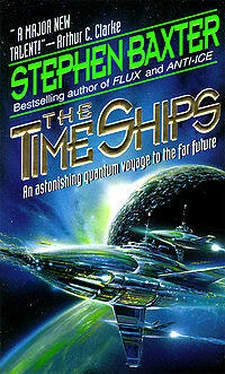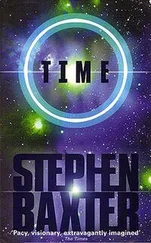Yes — people! — women and men, not unlike myself. For this city evidently came from a time not so impossibly removed from my own, that the blunt hand of evolution had not yet remade mankind.
Great roads looped off over the countryside, joining this future London to other cities about the country — or so I surmised. These roads were populated by vast mechanisms: unicycles which each bore a score of men, huge produce carts which seemed to have no driver and must therefore be directed mechanically; and so forth. There were no details to represent the countryside between the roads, however, just a bland, gray surface.
The whole design was so huge — it was like one enormous building — that I imagine it could have housed twenty or thirty millions, as opposed to the meager four millions of the London of my day. Much of the model had its walls and floors cut away, and I was able to see little toy figures representing the populace, set about the many dozens of levels of the city. In the upper levels these inhabitants were dressed in variegated and gaudy designs, with capes of scarlet, hats as spectacular and impractical as a cock’s comb, and so forth. Those upper layers seemed to me a place of great comfort and leisure, being a sort of multiply-leveled mosaic of shops, parks, libraries, sumptuous homes, and the like.
But at the base of the city — in its ground floor and basement, so to speak — things were rather different. There, great machines slouched, and ducts, pipes and cables ten or twenty feet across (in the full scale) snaked across the ceilings. Dolls were set here, but they were dressed uniformly in a sort of pale blue canvas, and their personal arrangements were restricted to great communal eating and sleeping halls; and it seemed to me that these lower workers must scarcely get a glimpse, in the general order of things, of the light which bathed the lives of the upper folk.
This model was aged and far from perfect — in one corner the pyramid-case had collapsed, and the model there had been smashed up out of recognition, and elsewhere the little dolls and machines had been tumbled over or broken by small disturbances down the ages; and in one place the blue-suited dolls had been set up in little circles and patterns, as if by the playful fingers of the Eloi — but still, the toy city has been a source of continuing fascination to me, for its people and gadgets are close enough to my sort to be intriguing, and I have spent long hours picking out new details about its construction.
It seems to me that this vision of the future might represent a sort of intermediate step in the development of the grisly order of things in which I have found myself. Here was a point in time at which the separation of mankind into Upper and Lower remained largely a social artifact, and had not yet begun to influence the evolution of the species itself: The city was a beautiful and magnificent structure, but if it led to this world of Morlock and Eloi — it was a monument to the most colossal folly on the part of Humanity!
The Palace of Green Porcelain is set on a high, turfy down, but there are meadows nearby which are well-watered. I dismantled my Time Machine, and scoured the Palace for materials, and from these I devised simple hoes and rakes. I broke the soil in the meadows about my Palace, and planted seeds from the Morlock fruit.
I persuaded some of the Eloi to join me in this enterprise. At first they were willing enough — they thought it was some new game — but they lost enthusiasm when I had them keep at their repetitive tasks for long hours; and I had some qualms when I saw their delicate robes stained with soil, and those pretty oval faces running with tears of frustration. But I kept at it, and, when things got too monotonous, I jollied them along with games and dances, and clumsy renditions of “The Land of the Leal,” and what I could remember of the “swing” music of 1944 — that is particularly popular with them — and gradually they have come about.
Growing cycles are not predictable, here in this Age which lacks seasons, and I had to wait no more than a few months before the first canes and plants bore fruit. When I presented these to the Eloi, my delight evoked only puzzlement in their little faces, for my poor first efforts could not compete for flavor and richness with the provisions of the Morlocks — but I could see the significance of these foodstuffs beyond their size and flavor: for with these first crops, I had begun the slow disentanglement of Eloi from Morlock.
I have found enough of the Eloi with an aptitude for the work to establish a number of little farms, up and down the valley of the Thames. So now, for the first time in uncounted millennia, there are groups of Eloi who can subsist quite independent of the Morlocks.
Sometimes I am wearied, and I feel what I am doing is less teaching than modifying the instinct of intelligent animals; but at least it is a start. And I am working with the more receptive of the Eloi to extend their vocabulary, to enrich their curiosity — you see, I mean to reawaken Minds!
But I know that to provoke and excite the Eloi in this way is not sufficient; for the Eloi are not alone, in this latter earth. And if my reforms among the Eloi continue, the equilibrium, however unhealthy, between Eloi and Morlock will be lost. And the Morlocks must inevitably react.
A new war between these post-human species would be disastrous, it seems to me, for I could not imagine that my precarious agricultural initiatives would survive much diligent assault by the Morlocks. And I must push out of my mind any antiquated notions of loyalty, to one side or the other! As a man of my time, my sympathies lie naturally with the Eloi, for they appear the more human, and my work with them has been pleasurable and productive. In fact it is an effort for me to remember these little folk are not human — I think if I saw a man of my own century now, I should be astonished by his height, bulk and clumsiness!
But neither Eloi nor Morlock are human — they are both post -human — regardless of my antique prejudices. And I cannot solve the equation of this degenerate History without addressing both its sides:
That is, I must face the Darkness.
I have determined to descend once more into the Morlocks’ subterranean complex. I must find ways to negotiate with that subterranean race — to work with them, as I have the Eloi. I have no reason to believe this is impossible. I know that the Morlocks have a certain intelligence: I have seen their great underground machines, and I recall that, when it was in their captivity, they disassembled, cleaned and even oiled the Time Machine! It may be that beneath their surface ugliness the Morlocks have an instinct which is closer to the engineering enterprise of my own day than that of the passive, cattle-like Eloi.
I know well — Nebogipfel taught me! — that much of my dread of the Morlocks is instinctive, and proceeds from a complex of experiences, nightmares and fears within my own soul, irrelevant to this place. I have had that dread of darkness and subterranean places since I was a boy; there is that fear of the body and its corruption which Nebogipfel diagnosed — a dread which I may share, I think, with many of my time — and, besides, I am honest enough to recognize that I am a man of my class, and as such have had little to do with the laboring folk of my own time, and in my ignorance I have developed, I fear, a certain disregard and fear. And all of these fragments of nightmare are amplified, a hundredfold, in my reactions to the Morlocks! But such coarseness of soul is not worthy of me, or my people, or the memory of Nebogipfel. I am determined that I should put aside such inner dark, and think of these Morlocks not as monsters, but as potential Nebogipfels.
Читать дальше
Конец ознакомительного отрывка
Купить книгу









